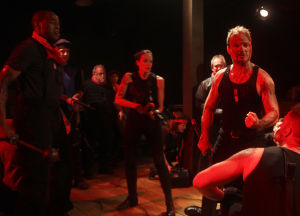Rereading Othello over the past couple of weeks was a strange experience for me. It was (almost) the first Shakespeare play I read. (The first was actually Romeo and Juliet, but not only can one never really step away from Romeo and Juliet, but I’ve also watched it in more recent years. Othello, however, I have not read, watched, or talked about since tenth grade.) I hardly remember any of the analysis from high school, of course, but so many lines and passages echoed from across the expanse of years during this reading.
I also had a peculiar feeling of reality, and at least Katy agreed with me; all of the events seemed much more plausible than Shakespeare usually does. What makes it so different? Is it the near-obedience to the Greek principles of dramatic unity? Othello is more concise than most Shakespeare plays. There is only one significant setting change, and it happens so early on that we nearly forget that the action started in Venice rather than in Cyprus. Although there are characters who don’t know each other, there aren’t any subplots in the full sense of the word; even the peripheral people and motivations, like Roderigo and his goal to seduce Desdemona, are directly related to the central conflict. As for the progression of the action, the entire play takes place within a couple of days and seems to skip little of importance. Together, all of these aspects present a quite lifelike, immediate story.
More importantly, this play is unusual in its situation—that is, unusual for Shakespeare but more familiar for us. Most tragedies (and comedies, for that matter) deal with matters far beyond my experience: monarchies, incest, murder, family feuds, etc. I don’t relate to Hamlet because, frankly, my father was never murdered in his orchard and my uncle never slept with my mother. Jealousy, however, is a universal situation, or nearly so. Of course, I have never felt the urge to murder due to jealousy, but who has not been led astray by a false friend or become uncertain of a loved one’s affections?
The combination of realism and devastation—the tragic and sad aspects, as Liz would say—makes me curious about what this play implies about the casual little evils we perpetrate every day and how they come about. Othello, after all, isn’t an immoral character; quite to the contrary, he is an exceedingly noble and honorable man. It is in fact his devotion to virtue that gets him into trouble, specifically his devotion to honor. He considers his murder of Desdemona an act done “all in honour,” that is, a fulfillment of his moral obligation to punish adultery (V.ii.301). Othello also casts his suicide in
the light of justice by comparing himself to a “malignant … Turk” who poses a threat to the security of Venice (V.ii.362).
How does a love of honor, in itself a good and virtuous thing, come to such violent ends? I think Iago is the key. The
character of Iago has been interpreted many ways, but I’d like to mention just one here: Iago is the devil. Traditional Christian theology imagines Satan as a powerful being who does evil just because he takes joy in evil, and although the bitter ensign gives a few reasons for his actions at the beginning of the play, I don’t quite see the logic even in a twisted Shakespearean way. If Iago wanted Cassio’s position, why not just kill Cassio? Iago will have no position at all if Othello is dead or imprisoned. As for the adultery claim, Iago says more than once that he has only an inkling and is not at all sure he’s right. Instead, I think that Iago just enjoys making trouble and looks for any excuse to do so. Shakespeare confirms Iago’s true identity when Othello pines that he can’t kill him: “If that thou beest a devil, I cannot kill thee” (V.ii.293). In the ensuing scuffle in which Othello tries to kill him anyway, Iago informs us that he is hurt but certainly not dead, just as Satan would be if attacked.

Iago and Othello: Never trust a man with a mustache like this. (I was unable to determine any genuine information about the artist or source.)
Iago, devilish thing he is, takes advantage of Othello’s dedication to one virtue, honor, by confusing his perception of another, honesty. Everyone knows Iago is “honest” (was there ever a more constant epithet in Shakespeare?), so Othello doesn’t worry about judging that virtue in others for himself. If honest Iago gives a fact, it’s a fact, no matter what anyone else says. I mean, we don’t say “honest Emilia,” do we? “Honest Desdemona” doesn’t have the same ring to it, either. When these two women tell Othello the truth about Desdemona’s chastity, Othello can’t believe it. Othello’s virtue of choice is honor, and honorable Othello is too focused on being honorable to worry about judging honesty; that’s what honest Iago is for. This misplaced moral focus leads to a moral imbalance, which in turn leads to tragedy. Othello realizes this after his grave mistake: “why should honour outlive honesty?” (V.ii.252). The latter virtue is just as important to think about as the first, and he’s been passing off his duty to embody it to another person, who unfortunately isn’t a moral being.
This is all a very preliminary exploration into Othello‘s commentary on human nature and its proclivities towards jealousy, zealousness, and betrayal. I have mentioned the points that meant the most to me, but I’m starting to think that this play is an even deeper rabbit hole than Hamlet is. As I said, though, Othello is more accessible to us in many ways, and its heartbreaking path from minor mistakes to utter destruction ought to be a subject of meditation. Shakespeare’s message is that this could happen to anyone who interacts with other human beings, and that means most of us.






